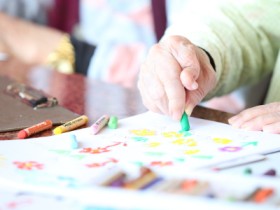Children with developmental delays often face challenges in performing everyday tasks that others may take for granted. Tasks like getting dressed, holding a pencil or playing with peers require a combination of motor skills, sensory processing and cognitive abilities. Occupational Therapy (OT) at Nai Disha for Kids is designed to help children build these essential skills for daily living. In this blog, we’ll explore how OT can help children overcome challenges and gain greater independence.
What is Occupational Therapy?
Occupational therapy is a specialized treatment aimed at improving a child’s ability to perform everyday tasks that are necessary for functioning in their environment. OT addresses key areas such as fine and gross motor skills, sensory integration, self-care and social interaction. It’s not just about physical tasks; OT helps children build confidence and independence by engaging them in activities that promote growth in these critical areas.
Key Areas of Focus in Occupational Therapy
- Fine and Gross Motor Skills Development
Occupational therapy is instrumental in helping children develop the fine motor skills required for tasks like writing, drawing, eating with utensils or buttoning a shirt. OT also works on improving gross motor skills like walking, running and jumping. Through fun and engaging activities, occupational therapists help children strengthen these skills, allowing them to gain better control over their bodies and improve physical coordination. - Sensory Integration Therapy
Sensory processing challenges are common in children, particularly those with autism. Children may experience heightened sensitivity to certain sounds, textures or lights or they may be under-responsive to sensory input. Sensory integration therapy at Nai Disha for Kids uses structured activities to help children process and respond to sensory stimuli in a more balanced way. This approach helps children develop appropriate reactions to sensory input, improving their ability to navigate the world around them. - Self-Care Skills
An essential part of occupational therapy is teaching children self-care tasks such as dressing, grooming and feeding themselves. These skills are fundamental for promoting independence, self-reliance and confidence. Through structured OT activities, children learn how to manage their personal needs, empowering them to take on more responsibilities and boost their self-esteem. - Hand-Eye Coordination
OT activities focus on improving hand-eye coordination, which is crucial for tasks such as drawing, using utensils and participating in sports. By incorporating games, puzzles and exercises into therapy, occupational therapists at Nai Disha for Kids help children improve coordination and perform tasks with more accuracy and ease. This improvement not only helps children in school and everyday life but also supports their physical and emotional development. - Play-Based Therapy
Play is an essential aspect of children’s development and it also serves as a valuable tool in occupational therapy. Through play, children learn to interact with others, practice motor skills and enhance cognitive abilities. At Nai Disha for Kids, our OT sessions incorporate play-based interventions that make therapy both enjoyable and effective, promoting development in a natural, fun and engaging way.

